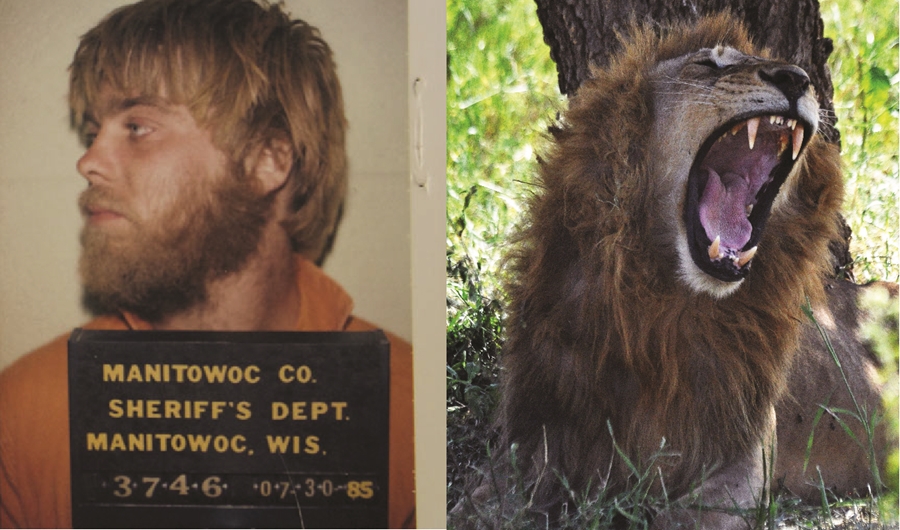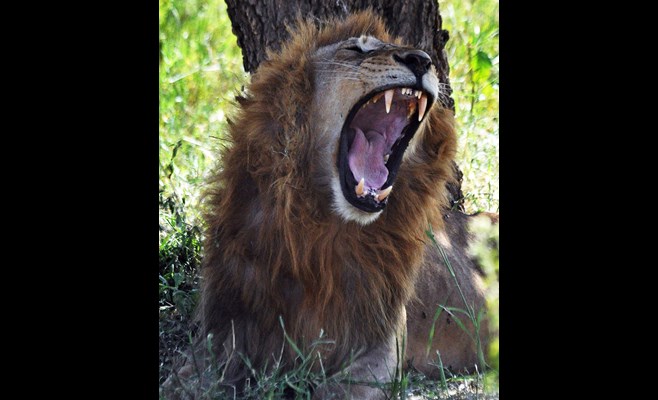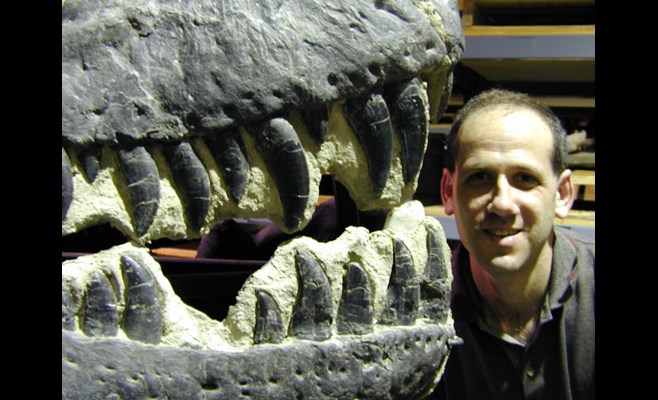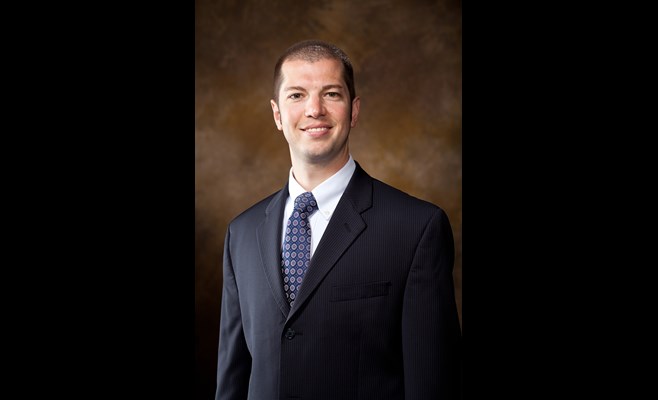Honors College 'Signature Seminars' to Feature Top Scholars, Big Issues

Teeth, and a troubled prosecution, are the subjects of the first round of Honors College Signature Seminars, which will debut next spring. Lion photo courtesy Peter Ungar; Avery photo courtesy Manitowoc Co. Sheriff's Dept.
FAYETTEVILLE, Ark. – The University of Arkansas Honors College is launching a new series of “Signature Seminars” led by top scholars and focused on cutting-edge issues.
The new series will debut in the spring 2017 semester with “Teeth: Evolution’s Bite,” taught by Peter Ungar, Distinguished Professor and chair of the Department of Anthropology in the J. William Fulbright College of Arts and Sciences, and “Prosecution: (Un)Making a Murder,” led by Brian Gallini, law professor and associate dean for research and faculty development in the School of Law.
The courses are the brainchild of new Honors College Dean Lynda Coon.
“One of the reasons I took this job was to create some new, imaginative curricular experiences for our students,” Coon said. “We want to have our top faculty on campus invite honors students into their research world at a very high level, teaching big subjects that bridge multiple disciplines.”
The Signature Seminars, designated HNRC 4013H in the university’s Catalog of Studies, will be the first courses offered specifically by the Honors College. Most honors courses and honors sections are offered through the honors programs in each college and school. After the spring 2017 debut, two Signature Seminars will be offered each semester on a wide range of topics, from hunger and aging, to water, profit and Jesus.
Deans of each college may nominate professors to participate, and those who are selected to teach will become Dean’s Fellows in the Honors College. Over time, the Honors College may bring in leading scholars from other institutions to teach some of these courses, as well.
Honors students must apply to participate, and those selected will be designated Dean’s Signature Scholars. The application for the courses will be posted online in August 2016, and Ungar and Gallini will present introductory lectures in September to give students an overview of the seminars. The presentations will be on Sept. 7 and 14, respectively, in Gearhart Hall Auditorium.
“I am so thrilled to share my passion for teeth with the U of A’s best and brightest students in this signature seminar,” Ungar said. “I think it will be a fun learning experience for all, and I’m honored to be among the first faculty members named a Dean’s Fellow in the Honors College.”
“This is an exciting time for the University of Arkansas, the Honors College and the School of Law,” Gallini said. “It’s a privilege to help bring Dean Coon’s innovative idea to reality and to have the opportunity to teach some of the campus’ most talented and inquisitive students.”
TEETH: EVOLUTION’S BITE
Most of us only think about teeth when something’s wrong with them — when they come in crooked, break or begin to rot. But consider teeth as the extraordinary feat of engineering they are.
They concentrate and transmit the force needed to break food, again and again, millions of bites over a lifetime. And they usually do this without being broken in the process — with the very same raw materials used to make the plants and animals being eaten. Chewing is like a perpetual death match in the mouth, with plants and animals developing tough or hard tissues for protection, and teeth evolving ways to sharpen or strengthen themselves to overcome those defenses. The variety of tooth types, especially across mammals, is extraordinary.
It’s a testament to what evolution can accomplish given time, motive and opportunity. Lots of animals have “teeth.” Sea urchins, spiders and slugs all have hardened tissues used for food acquisition and processing, but real teeth, like yours and mine, are special. They first appeared half a billion years ago, and nature has spent the whole time since tinkering with ways to make them better. It’s a story written in stone—the fossil record.
PROSECUTION: (UN)MAKING A MURDER
The trials of Steven Avery, a troubled youth with an estimated IQ of 70, have been well documented in the Netflix series Making a Murderer. Avery served 18 years in prison for first-degree sexual assault, attempted first-degree murder and false imprisonment. In 2003, he was exonerated on the basis of improved DNA testing.
Avery filed a civil lawsuit for $36 million in damages against Manitowoc County in Wisconsin, its sheriff and its district attorney. In 2005, while that case was pending, Avery was arrested for the brutal murder of photographer Teresa Halbach after her car and charred bone fragments were found in the salvage yard owned by Avery’s family.
DNA testing … Miranda rights … coerced confession … underage witness … tampering with evidence … and two requests for a presidential pardon. Both investigative and trial errors pervade the prosecution of Avery. Can officers simply walk onto your property without a warrant? Can a prosecutor call a press conference and outline unproven facts for the world while assuming a suspect’s guilt? Can investigators interrogate a juvenile suspect for hours at a time without a lawyer or at least an adult present? This seminar will tackle these questions, among so many others, to understand why Avery should, wholly apart from his factual innocence, be “unmade” as a murderer.
Visit Signature Seminars on the Honors College website for more information on these courses and the inaugural Dean’s Fellows who will be teaching them.
About the Honors College: The University of Arkansas Honors College was established in 2002 and unites the university’s top undergraduate students and professors in a learning environment characterized by discovery, creativity and service. Each year the Honors College awards up to 90 freshman fellowships that provide $70,000 over four years, and more than $1 million in undergraduate research and study abroad grants. The Honors College is nationally recognized for the high caliber of students it admits and graduates. Honors students enjoy small, in-depth classes, and programs are offered in all disciplines, tailored to students’ academic interests, with interdisciplinary collaborations encouraged. Fifty percent of Honors College graduates have studied abroad – three times the national average – and one hundred percent of Honors College graduates have engaged in mentored research.
About the University of Arkansas: The University of Arkansas provides an internationally competitive education for undergraduate and graduate students in more than 200 academic programs. The university contributes new knowledge, economic development, basic and applied research, and creative activity while also providing service to academic and professional disciplines. The Carnegie Foundation classifies the University of Arkansas among only 2 percent of universities in America that have the highest level of research activity. U.S. News & World Report ranks the University of Arkansas among its top American public research universities. Founded in 1871, the University of Arkansas comprises 10 colleges and schools and maintains a low student-to-faculty ratio that promotes personal attention and close mentoring.
Topics
Contacts
Lynda Coon, dean
Honors College
479-575-7678,
llcoon@uark.edu
Kendall Curlee, director of communications
Honors College
479-575-2024,
kcurlee@uark.edu
Headlines
U of A's Inspirational Chorale Makes Its Carnegie Hall Debut
The U of A's Inspirational Chorale took center stage at Carnegie Hall in March, performing under the direction of professor Jeffrey Murdock to a packed audience at the iconic Stern Auditorium.
The State of Economics With Mervin Jebaraj Set for June 5
U of A economist Mervin Jebaraj will analyze state's economic trends and regional issues in an upcoming talk. Preregistration is required by May 31.
Faculty Demonstrate Dedication to Student Success Through Teaching Credentials
Eight faculty members from across the U of A have earned the prestigious Association of College and University Educators certification in Effective College Teaching.
Artificial Intelligence, Machine Learning Boost Arkansas Animal Science Research
Aranyak Goswami, a bioinformatics specialist, will work with three different departments to boost the research arm of the U of A System Division of Agriculture.
College of Education and Health Professions Doctoral Student Picked for Grosvenor Fellowship
Jessica Culver, a doctoral student in the College of Education and Health Professions Adult and Lifelong Learning program, has been selected as a member of the 2024 Grosvenor Teacher Fellowship.








